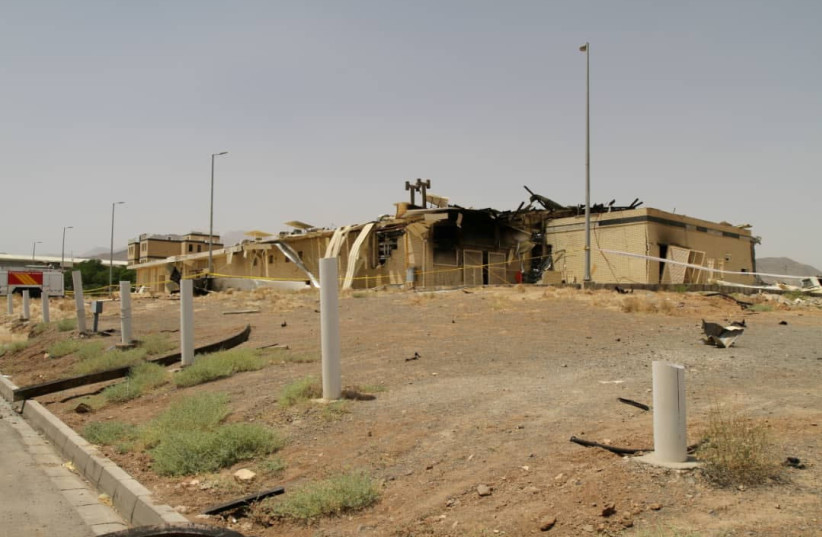Sabotage at Iran's Natanz nuclear facility 3.0? - Analysis
Was Iran's Natanz nuclear facility just attacked for the third time in two years?
By YONAH JEREMY BOB
Published: DECEMBER 4, 2021

VIEW OF a damaged building after a fire broke out at Iran’s Natanz Nuclear Facility, in Isfahan on July 2.
(photo credit: ATOMIC ENERGY ORGANIZATION OF IRAN/WANA VIA REUTERS)
Did Israel's Mossad or someone just try to sabotage Iran's nuclear facilities at Natanz for the third time since July 2020?
Reports were still hazy, but as of Saturday night the narratives varied from: Iran undertook a preplanned air defense drill unrelated to sabotage, it shot down an attack drone thwarting a sabotage attempt, electricity and internet were down for some unspecified part of Natanz - which could mean a sabotage attempt succeeded, but the Islamic Republic is still trying to cover it up.
Natanz was hit by physical explosive sabotage in July 2020 and again in April of this past year.
The July 2020 attack was more successful and destroyed the vast majority of an above ground nuclear site.
An April attack destroyed centrifuges and a variety of utilities of a newer underground site, but only fully delayed Iran's advanced centrifuge progress for about four months, while causing some longer-term slow downs.
Curiously, the April attack took place near the start of Vienna nuclear negotiations.
If this event was an attack it will have taken place at the end of a new first week of nuclear negotiations.
Both in July 2020 and this April, Iran initially tried to deny there was an attack or deny its success until the Jerusalem Post reported that the attacks were successful and had caused severe damage.
Following the Post's and other media reports, Tehran was forced to acknowledge that its nuclear sites had been hit, and badly.
It later accused the Mossad of both hits, so Tehran's initial denials should be taken with a grain of salt.
Another nuclear site, Karaj was hit this past June days after Ebrahim Raisi was elected Iran's new president.
This could be a second message to Raisi that his attempt to push the envelope with increasing nuclear violations as well as taking maximalist positions in Vienna could leave him vulnerable, even if much of the West is intimidated by him.
Or maybe this time Iran's air defenses improved and thwarted an attack.
Then again, for the first time in four such similar events, maybe it was just a pre-planned air defense drill.
Satellite footage made it impossible for Tehran to cover up the damage in both Natanz attacks, but strangely satellite footage was slower in coming with Karaj, when Raisi had taken power and the Biden administration was seeking a return to talks.
No comments:
Post a Comment